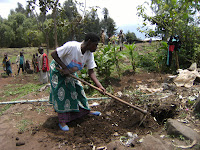 My informant at her compost heap
My informant at her compost heapIn the Twa village where we go for day two of the workshop, groups of four or five students are to prepare and plant a sack garden. As we arrive, I see heaps of small stones for the core and rich, moist soil for the surround. I had been afraid there would be no compost. In fact each house has a heap, in the narrow surround before other people's crops begin. 'We might as well put all the rubbish in one place', I am told by one woman. And I realise that because of their relative isolation from recent development, these people have little that is not biodegradable.
Vegetable waste goes into the heap, as do ashes from cooking and the droppings of rabbits or sheep, which some keep. What about urine, I ask. Oh, we do that all over the place since we don't have toilets. Try asking all these little boys to pee on the compost heap, I suggest. (Faeces? I don't ask.)
Back in Kigali, as well as a sewage system which is gradually yielding increasing amounts of gas for cooking and lighting, there is now a compulsory household levy to pay for the weekly rubbish collection. Rachel, who is a keen vegetable gardener, tells me that last week the bin men berated her for not putting her kitchen waste into the bin. You're not supposed to make your own compost any more, she observes. The government is always looking for ways to make money. You have to send everything away now and let somebody deal with it and then buy back the compost they make from what you give them.
[A picture at last. it took nearly 20 minutes to load. I'll go back and try one where I said I'd send some before.]

No comments:
Post a Comment